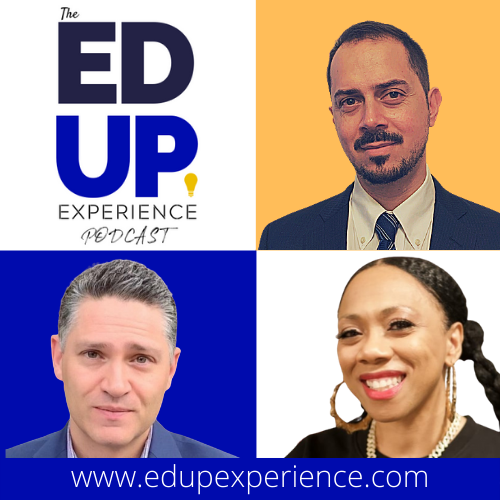Published on
Empowering Learners to Create Better Futures

Even as the pandemic has thrown higher ed off its track, it has given institutions the ability to refocus their strategic plans to focus on what matters most: the students. Students need to be prepared with the right skills to keep them relevant throughout their careers. With their evolving needs, it’s critical for institutions to keep up with this demand and adapt to meet them. In this interview, Dr. Joe Sallustio and Liz Leiba speak with Julie Wollman about how to prepare students for the real world, civic engagement and strategy development.
EdUp Experience: On Widener’s website you have the line, “Major in instincts, tenacity in real-world experience.” Talk to me about why you have that there in that way.
Julie Wollman (JW): Our focus is on getting the inside track, having those experiences and opportunities, the networking, the internships, the co-ops, conducting research with faculty. That prepares you to be ready for not just your first career, but the many careers you’re going to have in your life, as well as learning to be tenacious about making a difference in the world.
Our mission is empowering our community of learners to create a better future. One sentence—you can’t forget it. Part of creating a better future is creating a better future for yourself and your family through a career.
Part of it is the responsibility to create a better future for all of us in our local and global communities. We believe that we’re preparing students very broadly for those things, whether they’re undergraduate or graduate students.
EdUp Experience: Colleges seem to be moving in the direction of preparing students for the real world. Is that what students are telling you they want?
JW: I think everybody wants that, but that doesn’t mean they don’t need theory. And they need some grounding in understanding why they’re doing what they’re doing. You can have practical experience, but when the approach you’re taking doesn’t work, you need a theoretical or research background to fall back on.
It’s about integrating an understanding of the theory and research that are foundational in your field, so you can be an effective practitioner. Our students get both of those, and it’s so important to have those opportunities to do the work that students are preparing to do.
We also recognize that this may be your first career. So, learning practically how to do one thing doesn’t necessarily prepare you more broadly for the analytical thinking and the kind of care, attention, compassion for what you’re doing as a professional and a community member.
EdUp Experience: How important are humanity-based skills in problem solving, critical thinking, and in applying that theory?
JW: I’ve called them critical skills or power skills, because you can’t do any career without them. They’re strong, powerful. They’re what cut across any career. You have to be able to connect with people. You have to be able to communicate successfully. You have to be able to think through a problem and solve it. These are skills that cut across any discipline.
Part of our responsibility as a university is to prepare students to be active, effective citizens in their communities, but also in their careers. A leader, whether the leader of a team or a big L leader needs to understand the people they’re working with and bring people together to be effective.
EdUp Experience: You talk about the commitment to diversity, equity and inclusion at Widener. Any unique initiatives you have going on there?
JW: We have monthly Diversiteas, where people gather to address a particular issue related to diversity. We also have a Diversity Leadership Inclusion Council, which is co-led by our chief diversity officer and our provost, broadly representative of the university.
It’s focused on moving us forward in diversity and inclusion initiatives. It also pays attention to the data. We have to look at equity gaps and how to close them in addition to looking at whether we’re making progress and what is actually working in doing that.
We just established a Diversity and Inclusion Committee for the faculty council. There was very strong support for that, to pay attention to what we’re doing in terms of the curriculum and student experience in the classroom. We’re doing things in a lot of different areas, and they’re all very complimentary and together make a significant difference. We’re all part of this community. We’re all valued. It’s an inclusive community, and we need to continue to remind ourselves we’re all Widener.
EdUp Experience: About 79% of Widener undergraduate students engage in service or civic engagement. How do you facilitate that?
JW: It’s very much infused into a lot of our classes. We have a faculty service learning professional development initiative run by faculty. So, faculty who engage with service learning in their classes, which is one aspect of civic engagement, teach others how to do it, and we have faculty fellows in service learning.
The problems we’re dealing with locally are also global problems. I want our students to understand that. If you’re dealing with health, education, food insecurity inequities as local problems, whatever you’re learning through addressing them can be used globally. You’re taking something away from this experience that you can use anywhere, that can make a difference in our world, and you have a responsibility to do that.
EdUp Experience: How did COVID-19 impact Widener?
JW: We entered COVID in a very strong position financially. We’re very fortunate that way. We sent our residential students home, so we took a significant financial hit from that because we refunded all of the room and board.
We tried to support students to continue, and gave new first-year students a bookstore voucher to help them pay. We removed a number of our fees, recognizing that this is an economic crisis, as well as a health crisis,.
Undergraduate is what declined some. But with the support we provided, our student retention rate increased very significantly between fall and spring, which helped us maintain enrollment and showed us that our initiatives were making a difference, that it made a difference to have a personal student success team, that it made a difference to have outreach.
They’ve actually built the relationships now, so when we go back to in-person learning, they’ll feel more comfortable with those using all those services.
EdUp Experience: What’s your take on the value of a college degree, and how we should be looking at that inside higher education?
JW: We have to be thinking about that. It’s an investment, an expensive investment, and there has to be a return on that investment. People care about the value. Sometimes they think it’s seen more narrowly than perhaps is realistic.
As we talked earlier about the skills that may prepare people for a variety of jobs—even though they may not seem to be very specific to a particular job—we’re fortunate at Widener because we are so focused on programs that lead to very successful careers.
We have collaborations between divisions, and this interdisciplinary work adds value to what students are getting because it gives them opportunities to do different things when they get out. They’re in programs that lead to very well-paid careers. There’s no question—the data are absolutely clear, and they’re not coming directly from colleges and universities but from economists: You earn a lot more with a college degree than without one, but you have to get the degree. You need the credential. It makes a difference in your annual income, and it makes a huge difference in your lifetime income. So, there’s no question that there’s value and a return on investment.
EdUp Experience: How important is digital marketing and social media for the future of marketing for colleges and universities?
JW: It’s not just important for the future—it’s important right now. Those who do the best job at digital marketing are going be much more successful. Part of that is targeted digital marketing, so not just putting ads out on Facebook or wherever students go. It’s really about targeting to the right group, figuring out who’s going to have interest in what you’re offering and who clicks on something. Then, you want to follow up with them. So much of it is really about using digital marketing very strategically and being very knowledgeable about how to do that. But you also need something to back it up. We can’t say, “Widener gives you the inside track” and not have evidence. You need to back up what you say with data, and that’s something that we really work on.
Different students want different things. Some students want convenience. For others, it may be that in-person experience on a campus. They want the other things that come with an education. We have to adapt to what our students want and need and the reality that our student body is changing. They have different expectations.
EdUp Experience: Is there anything you’d like to add about Widener?
JW: One thing I would like to mention is our approach to strategy. We started a strategy development process about a year ago, where I said, we’re not doing traditional strategic planning. Traditional strategic planning is outdated.
By the time you’re done, you get this menu of goals that really aren’t strategic at all. They’re good things, table stakes. They’re what you need to do anyway to compete—a strategic plan that says something like increased enrollment or increase net tuition revenue. But that’s your business, not strategy. That’s how you survive.
Strategy should help you thrive. We started a process focused on strategy that was going to be overarching. We weren’t going to have a specific plan with all kinds of goals that people had to constantly think about, that sat on a shelf and collected dust.
Our strategy is about being agile and having an exceptional student experience, which comes back to this issue of reducing friction and making it easier to do things that have always been very bureaucratic in higher ed—or in any organization.
We need to be in a place where not only is our strategy development innovative, but our strategy itself allows us to adapt and constantly meet new needs.
EdUp Experience: What does the future of higher ed looks like?
JW: My greatest fear is that it becomes a bifurcated set of two systems–one for the elite and one for everyone else, and that the latter is inexpensive but of lower quality and doesn’t provide what everyone deserves.
Higher education is a public good, and everyone who wants it should have an opportunity to get it. But we can’t have two systems. We really have to think about how we are going to adapt to meet the needs of our students and to think about our business model and how we reduce our costs, so we can lower tuition and provide greater access.
Higher ed institutions have the ability to survive through a lot–and they do survive. I’m not satisfied with survival. I want us to thrive, and that’s our focus.
This interview was edited for length and clarity.
Listen to the full interview here.

Disclaimer: Embedded links in articles don’t represent author endorsement, but aim to provide readers with additional context and service.
Author Perspective: Administrator



